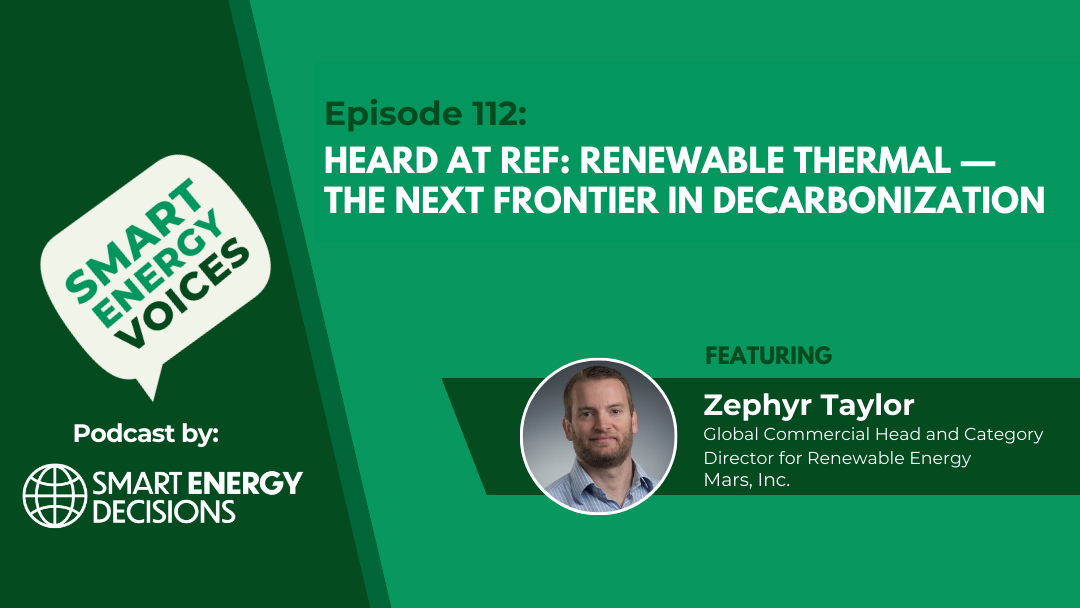Smart Energy Voices - Episode 112
Heard at REF: Renewable Thermal — The Next Frontier in Decarbonization
Listen on your Preferred Podcast Player »
In this episode of Smart Energy Voices, Zephyr Taylor, Global Commercial Head and Category Director for Renewable Energy at Mars, Inc., takes a close look at the topic of Scope 1 emissions and industrial heat decarbonization. While many companies are comfortable sourcing renewable electricity for their Scope 2 targets, Scope 1 — specifically the challenge of decarbonizing industrial heat — is a different story. This episode tackles the technology, economics, and internal company dynamics required to make progress in this area.
You will want to hear this episode if you are interested in...
- Understanding Scope 1 decarbonization (02:37)
- Technological solutions for renewable thermal (05:01)
- Challenges and market dynamics of renewable thermal (09:11)
- Mars' renewables projects (13:30)
Scope 1: The Next Decarbonization Frontier
While Scope 2 emissions have received a lot of attention in industrial applications, Scope 1, particularly for manufacturers relying on natural gas steam boilers, is becoming the next critical area of action. Decarbonizing industrial heat is central to meeting aggressive renewable energy targets, and Taylor emphasizes the urgency of moving beyond electricity to address this.
Strategic Technological Solutions
One of the key strategies is electrification, which involves switching to electric heat pumps or boilers. This reduces reliance on natural gas and shifts the focus to renewable electricity. However, when electrification isn't feasible, other options like biomass, biogas and concentrated solar thermal can play roles. Each technology has its pros and cons, and the best solution depends on specific site conditions and operational needs.
Economic Realities of Renewable Thermal
Renewable thermal solutions often come with a higher price tag than renewable electricity. Taylor highlighted that, on average, costs for renewable thermal technologies can be five to 10 times higher than traditional natural gas. This makes it essential for companies to weigh their options carefully, balancing environmental goals with financial realities.
The Promise and Challenge of RNG
Renewable natural gas (RNG) offers a promising way forward, especially because it can be used in existing natural gas infrastructure. However, the RNG market is still growing, which means supply and cost can be uncertain. Taylor advised companies to act quickly in securing RNG supplies as demand rises and the market matures.
Connect with Zephyr Taylor
As the Global Commercial head for Renewable Energy & Carbon Credits at Mars Inc., Zephyr Taylor oversees Mars’ renewable energy sourcing throughout the world – including market assessment, supplier engagement, deal structuring and negotiation, and key internal stakeholder partnering, alongside team oversight and organizational alignment. Zephyr has led the development and execution of strategic sustainability initiatives in the public and private sector globally. His expertise spans policymaking, commercial negotiation, project development and transaction structuring, and thought leadership on organizational reform and stakeholder mobilization. Zephyr holds an MBA and Master of Environmental Management degrees from Yale University. He received his undergraduate degree with Highest Honors in Economics from the University of North Carolina at Chapel Hill.
- Smart Energy Decisions
-
Follow us on LinkedIn
Subscribe to Smart Energy Voices on
If you're interested in participating in the next Smart Energy Decisions Event, visit smartenergydecisions.com or email our Community Development team at [email protected]
Apple Podcasts, Google Podcasts, Android, Spotify, Stitcher, TuneIn Radio, aCast, PlayerFM, iHeart Radio











